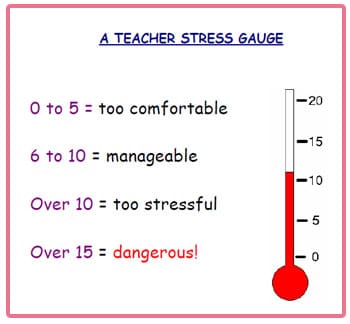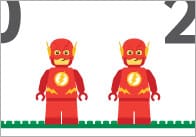Understanding levels of stress in the classroom

This is part of a series of posts taken from Dr David Smawfield’s catalogue of resources created to help new teachers, or teachers in training, feel comfortable in their new classes and effectively control their new pupils. Here are some benefits of using group work in primay schools…
Activities need to be organised in such a way that the demands placed on the teacher remain manageable. The following explanations describe how this can be achieved.
Some types of student activity and classroom activity place more demands on the teacher than others:
– Teaching a new concept
– Revision
– Silent reading
If the demands placed on a teacher are too high, stress levels will also be too high. An important challenge with group work is to try to arrange activities so that teacher demands and stress are kept to acceptable levels. To explain this principle during a training programme, the following is a light hearted way:
Let us imagine we have an instrument, something like a thermometer, which measures teacher stress:
– Stress levels between 0 and 5 are too comfortable (the teacher should still have spare energy to do other things in the class!)
– Stress levels between 6 and 10 are medium, but manageable.
– Stress levels above 10 are very uncomfortable, unsatisfactory, and unsustainable.
– Sustained stress levels above 15 are physically dangerous: the teacher is at risk of a nervous breakdown or worse!
– Let us now consider a scoring system:
– If one group works on a Low Teacher Demand Activity, the teacher Stress Factor = 1.
– If one group works on a Medium Teacher Demand Activity, the teacher Stress Factor = 3.
– If one group works on a High Teacher Demand Activity, the teacher Stress Factor = 5.

In summary, the purpose of these examples is to reinforce an understanding of the ways groups can be organised, and particularly in relation to the demands placed on the teacher.
Dr Smawfield is a senior international development consultant based in the UK and has a strong background in teacher education. He has worked in countries around the world, including Bangladesh, Malawi, Romania and Vietnam and is especially interested in active learning and low-cost teaching aids. You can find out more about his work on his website.
Popular Teaching Resources
Stay Up To Date
Sign up for our newsletter and we’ll let you know when we create new early years resources.





